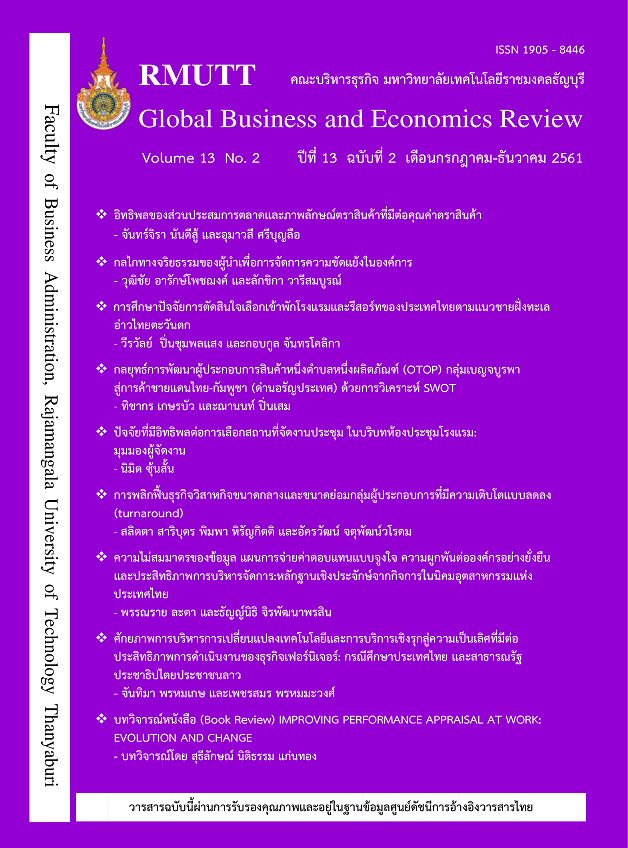INFORMATION ASYMMETRY, INCENTIVE-BASED COMPENSATION PLANS, SUSTAINABLE ORGANIZATIONAL COMMITMENT AND MANAGERIAL PERFORMANCE: EMPIRICAL EVIDENCE FROM INDUSTRIAL ESTATE AUTHORITY OF THAILAND
Keywords:
Information Asymmetry, Incentive-Based Compensation Plans, Sustainable Organizational Commitment, Managerial PerformanceAbstract
The main purpose of this study is to examine the influences of information asymmetry, incentive-based compensation plans and sustainable organizational commitment on managerial performance. It is well known that Information asymmetry happens when the firm has subordinates who have more private information or possess confidential information about their work environment and responsibility function than their top managers. The existence of a subordinate’s private information is an illustration of information asymmetry. This study posits a positive assumption that subordinates have more private information about their responsible work and share it as result to provide the firm receive the additional information and the useful information for decision making of top managers in the future. The data were collected from a survey of 270 firms. Moreover, 270 firms are classified into two groups: high and low information asymmetry groups to compare and confirm the result of regression. The results find that information asymmetry, incentive-based compensation plans, and sustainable organizational commitment have a positive effect on managerial performance. The robust test of comparison between both groups confirms that information asymmetry, incentive-based compensation plans, and sustainable organizational commitment have a positive effect on managerial performance in the group of high information asymmetry situation as well.
References
Abbas, A. (2017). Earnings fraud and financial stability. Asia Pasific Fraud Journal, 2(1), 117-134.
Angel, H .L., & Perry, J. L. (1981). An empirical assessment of organisational commitment and organisational effectiveness. Administrative science quarterly, 26(1), 1–14.
Armstrong, J. S., & Overton, T. S. (1977). Estimating non-response bias in mail surveys. Journal of Marketing Research, 14(3), 396-402.
Balkin, D. B., & Gomez-Mejia, L. R. (1990). Matching compensation and organizational strategies. Strategic Management Journal, 153–169.
Chong, V.K., & Eggleton, I.R.C. (2007). The impact of reliance on incentive-based compensation schemes, information asymmetry and organizational commitment on managerial performance. Management Accounting Research, 18, 312–42.
Chong, V.K., & Law, M.B. (2016). The effect of a budget-based incentive compensation scheme on job performance. Journal of Accounting & Organizational Change, 16, 590-613. .
Hair, J. F., Black, W. C., Babin, B. J., & Anderson, R. E. (2010). Multivariate data analysis (6th ed.). New Jersey: Pearson Education International.
Hall, M. (2008). The effect of comprehensive performance measurement systems on role clarity, psychological empowerment and managerial performance. Accounting, Organizations and Society, 33, 141-63.
Jaramillo, F., Mulki, J. P., & Marshall, G. W. (2005). A meta-analysis of the relationship between organizational commitment and salesperson job performance: 25 years of research. Journal of Business Research, 58, 705-714.
Jensen, M. C., & Meckling, W. H. (1976). Theory of the firm: managerial behavior, agency costs and ownership structure. Journal of Financial Economics, 3(4), 305-360.
Joe, S. W. (2010). Assessing job self-efficacy and organizational commitment considering a mediating role of information asymmetry. The Social Science Journal, 47(3), 541-559.
Kaplan, R. S., & Atkinson, A. A., (1998). Advanced management accounting (3rd ed.) New Jersey: Prentice Hall.
Lata, P. (2017). Integrated performance measurement system strategy and firm success: an empirical investigation of Thai-Listed Firms. (Doctoral dissertation of Philosophy in Accounting, Mahasarakham University).
Markl-Davies, D. M., & Brennan, N. M. (2007). Discretionary disclosure strategies in corporate narratives: Incremental information or impression management? Journal of Accounting Literature, 26(1), 116-194.
Ndofor, H .A., Wesley, C. & Priem, R .L. (2013). Providing CEOs with opportunities to cheat: the effects of complexity-based information asymmetries on financial reporting fraud. Journal of Management, 41, 1774-1797.
Nunnally, J. C. & Bernstein, I. H. (1994). Psychometric Theory. New York: McGraw-Hill.
Porter, L., Steers, R., Mowday, R., & Boulian, P. (1974). Organizational commitment, job satisfaction, and turnover among psychiatric technicians. Journal of Applied Psychology, 59, 603-609.
Rezaee, Z. (2005). Causes, consequences, and deterence of financial statement fraud. Critical Perspective on Accounting, 16, 277-298.
Sprinkle, G.B. (2000). The effect of incentive contracts on learning and performance. The Accounting Review, 75(3), 299-326.
Tolentino, R. C. (2013). Organizational commitment and job performance of the academic and administrative personnel. International Journal of Information Technology and Business Management, 15(1), 51-59.
Vlad, M.,Tulvinschi, M., & Chirita, I. (2011). The consequences of fraudulent financial reporting. The USV Annals of Economics and Public Administration, 11(1), 264-268.
Yamane, T. (1973). Statistic: An Introductory Analysis. (3rded.) New York: Harper and Row.
Downloads
Published
How to Cite
Issue
Section
License
The articles published in this journal are the intellectual property of their respective authors.
The views and opinions expressed in each article are solely those of the individual authors and do not reflect the positions of Rajamangala University of Technology Thanyaburi or any of its faculty members. All components and content of each article are the sole responsibility of the respective authors. In the event of any errors, the authors shall bear full responsibility for their own work.








